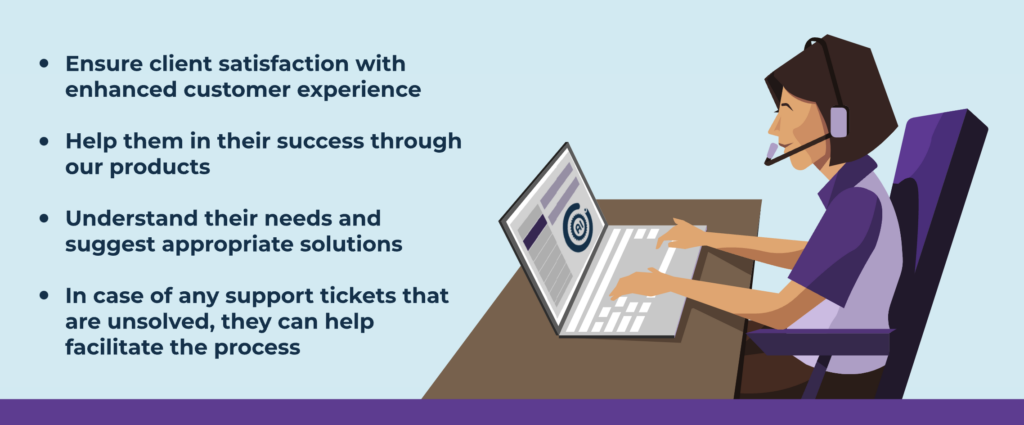Importance of AI customer success management after delivery and deployment
Introduction – The need for customer success management practices With the increasing penetration of Artificial Intelligence in the business world, it becomes imperative for AI products and solution companies to engage their clientele in different post-deployment practices. According to Gartner, only 53% of AI projects make it from prototypes to production, which means most companies…

Introduction – The need for customer success management practices
With the increasing penetration of Artificial Intelligence in the business world, it becomes imperative for AI products and solution companies to engage their clientele in different post-deployment practices. According to Gartner, only 53% of AI projects make it from prototypes to production, which means most companies lack the ability to implement smart systems at scale [1]. AI products and services often need to be carefully monitored by their business vendors, and sufficient support and training should be provided to the customers using these products.

These customer success practices ensure that the deployed product continues to operate as planned after Go-live, and any challenges that may occur later are tackled. This blog offers key customer success management practices that form the latter part of the AI product Life cycle. These practices provide valuable support to companies that have invested in AI products and solutions to enhance their daily operations.
Why is the customer success team important for businesses?
The customer success team learns different processes at the customer’s end and understands their business needs to help them achieve their goals. Some of the key performance indicators of the customer success team are:

Customer support and customer success management of AI solutions
Challenges faced post-AI project deployment
Before going into the individual practices, it is important to highlight some of the key problems that might occur after deploying Artificial Intelligence tech.
- A key challenge is to understand and tackle some unpredictable results that may be generated from AI products. For example, coming across entirely new entities and intents in the Live phases that were not included during the training phase, could hinder the operating process of AI. This is a part of the continuous learning arc of AI.
- A second challenge is the possibility of changing business processes, use cases, and infrastructure which can require changing the way in which AI products have been deployed earlier. This may cause the need for additional customer support on a long-term basis.
- A third challenge is the lack of access to emergency support during critical operation failures, especially during the evening and night-time hours.
Remedial measures to manage AI products for customers after deployment
Initial discussions about overall performance and gathering info post deployment
This measure involves the customer success team having discussions and presentations about the overall performance of the AI bots and solutions.
These discussions include addressing activities such as performance monitoring using interfaces such as customer dashboard and graphical analyses. Over here, analysis of identified vs. non-identified parameters, automation grade, and overall accuracy can be determined.
Based on the identified results and goals determined, the customer success team with other key stakeholders outlines further actions to undertake.
Resolving technical difficulties
This is where the customer success team acts as an intermediary to connect technical team members between both businesses.
Discussions and actions involving any kind of technical requirements and resolving technical issues also are a part of this measure.
The customer success team also tackles issues around changing business procedures, use cases, and operational infrastructure. In this context, a customer success executive mainly understands the complete requirements of the customer and provides actionable resolutions for the same.
AI training support
This support consists of providing AI training for both AI bots and AI solutions, sharing knowledge about project management, product development, and product maintenance training.
Some of the training activities are similar to the ones carried out before the product goes live. However, a few might differ and at times include re-training for specific purposes depending on the customer issue or query that is being resolved.
Periodical and annual meetings for long-term benefits
Periodical meetings that may be monthly or bi-monthly, and annual meetings that can include senior management from both sides, are good practices to improve customer engagement.
In these meetings, the overall long-term pain points are outlined, and further discussions are undertaken to understand how to resolve the challenges. They also are a great platform for getting insights to enhance performance and delivery outcomes for business stakeholders.
Regarding yearly meetings, a future roadmap that spans one or more years is often created. Ticket analysis, checking AI bot replies and related modifications, updating and revamping goals targeted by the AI based on results achieved, and so on are a part of these meetings.
Conclusion: Customer success management for happy employees and streamlined work operations
In this blog, we saw several ways by which an effective customer success team can help businesses that have adopted the use of Artificial Intelligence in their workspace.
The hyper-care period and continuous support through customer success after the phases of solution delivery and deployment are key to successful AI implementation. The customer success team tries to learn the different processes at the customer end and understand their business needs to identify where an AI solutions company can help the customer to achieve their goals.

Implementing a customer success roadmap is as important as deploying AI automation and making it live. As a business leader that has taken a decision to adopt AI in daily operations, your organization should check if the important criteria are met by the business offering their AI products and solutions.
Sources
[1] Top 5 Artificial Intelligence implementation challenges and how your company could overcome them (Jan 21, 2021), Itrex. https://itrexgroup.com/blog/artificial-intelligence-challenges/#header
About Simplifai
Simplifai is an AI solutions company that provides Intelligent Process Automation (IPA) solutions for businesses in the form of Digital Employees. We provide top-of-the-line customer support and success practices for enhanced customer experience and satisfaction. We help our clientele successfully leverage our AI products by understanding their needs and suggesting appropriate actions.
Our customer support and success teams work 24/7 to ensure that all your business queries and issues are resolved for streamlined work operations. We implement a customer success roadmap that makes it easy for your business to implement and manage AI products and solutions at the workplace.
If you wish to know more about customer success and customer support services, please reach out to us here.
Read more
- Unlock the secret to customer engagement with business automation
- Email automation using Emailbot – the next big thing in customer support and other domains for your business
- AI-powered customer service in the insurance industry
- The role played by Intelligent Process Automation for insurance companies – streamlining the customer experience forever


